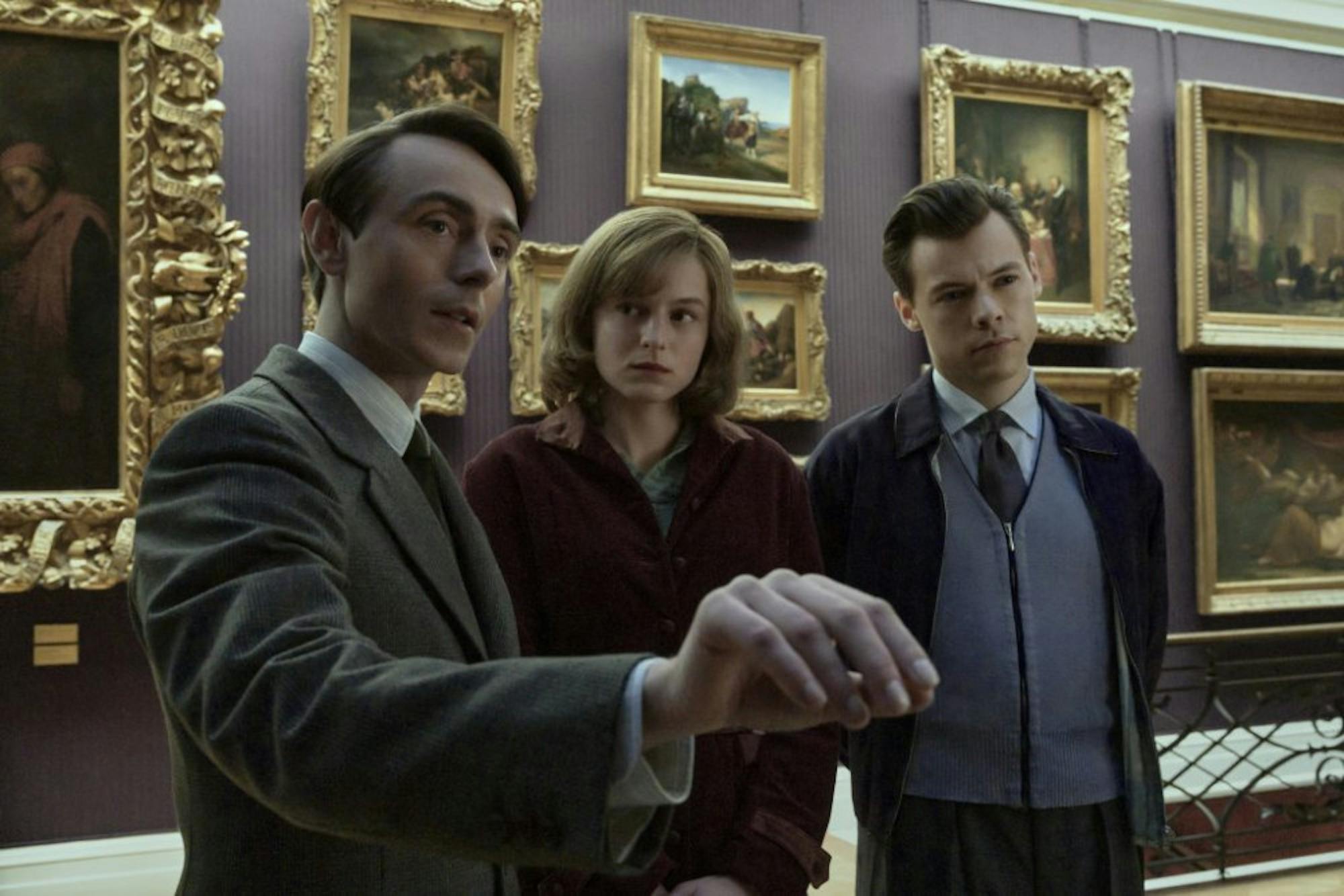Bourgeois, mid-twentieth century England! Stolen glances and forbidden love! A classical trope in the familiar shape of a love triangle! Michael Grandage’s third directed film, “My Policeman” is a surprisingly well-developed film packed full of enticing themes and enrapturing images for audiences to devour. After Harry Styles’ tragically-mediocre acting debut in “Don’t Worry Darling” (2022), audiences weren’t expecting much from a film starring this megastar-turned-actor. However, “My Policeman” proves that you can never underestimate a beautiful story.
“My Policeman,” released on Amazon Prime Nov. 4, tells the story of three heartstrong lovers, through a delicate dual-situated perspective, alternating between ’90s coastal England and ’50s city life in Brighton. When an old and invalid Patrick (Rupert Everett) arrives at the homestead of a matured Tom (Linus Roache) and his wife Marion (Gina McKee) in 1990 to be cared for after suffering from a stroke, old passions ignite and memories take life as the story of the three unfolds. In 1950, a younger, police-employed Tom (Harry Styles) falls in love with Patrick (David Dawson), a museum curator he meets on the street, but Tom marries schoolteacher Marion (Emma Corrin) in order to carry on with his regular, queerless life. Nevertheless, secrets burn and love lights fire as the three lovers attempt to balance their empty, dishonest lifestyles in a time when gay love was strictly illegal.
Let’s start with the elephant—or should I say pop star—in the room: Harry Styles. After a lackluster performance in his debut leading role, “My Policeman” was perhaps Styles’ last chance to redeem his acting career before getting spit right out of the mouth of Hollywood. Unfortunately, Styles just couldn’t keep up with his more talented co-stars in a movie that so delicately approaches an intensely tragic subject matter. Don’t get me wrong, I’m proud of him! Without Olivia Wilde on set to hypnotize him, it’s clear he had more time to focus on his actual performance. He can let out a stern yell, look stoic and moody and even convey some passion in his sure-to-be-infamous gay sex scenes, but it simply isn’t enough. Let’s just go back to the studio, Harry.

Now, I may be an easily manipulated viewer, but the film primarily succeeds in its audiovisual components. A film set in a posh ’50s environment is bound to have a pleasing old-timey soundtrack filled with smooth jazz and intoxicating ballads, but the film takes it a step further. Classical compositions echo and reverberate through the most emotional of scenes like the musical ghosts of the characters themselves, carefully dancing around the dialogue like gentle but wounded spirits. Alternatively, notes on the piano fly as wildly and with as much passion as the love affairs themselves during scenes of promiscuity and lovemaking. You may blush and feel embarrassed even just to be watching—but in a stroke of musical movie-magic, you can’t bring yourself to turn away.
Visually, the film is a masterpiece, if a little dishonest. Lush colors populate natural and industrial landscapes beautifully, and every shot has a romantically ignited feel that accentuates the drama of the events that transpire. When situated in 1990, however, somber vignetting and desaturated color grading leave you feeling as if the flame has long burned out, leaving a cold and desolate trio of somber characters to wallow in their unresolved sorrow. While this constant back-and-forth between two polar opposite tones could be jarring, the musical composition aids this traversal through time and crafts it into a delicate movement that never leaves a viewer feeling off balance. With this visual beauty, though, comes a strange kind of dishonesty. The film is so pristinely shot that it almost feels unreal, and when the subject matter tackles the life of gay men in a time where simply existing is a radical act, this perfection leaves a viewer feeling unconvinced. Is a colorful wonderscape an honest portrayal of the cadence of the lives of people who have to hide themselves as a condition for freedom?
Where I possess the most ambivalence for this film, however, is in its characters. Forming a sort of twisted love triangle, I could never quite bring myself to like the central characters fully, which makes the film inherently less impactful than it could have been. This is especially disappointing given the ending of the film, which is the film’s strongest segment by miles. The problem? It could’ve been even stronger, and so could the rest of the film. I don’t know if it’s the fault of the cast or the screenplay (probably both), but their dynamic feels like a run-down, walmart version of the trio from “The Talented Mr. Ripley” (1999) who were all developed with more nuance and skill in a strikingly similar diegetic environment.
In the end, I am annoyed with Tom’s dull and one-dimensional existence and angered by Marion’s hateful actions. The only character I truly feel for is Patrick, whose entire life is destroyed by the needlessly homophobic ideology of the mid-twentieth century. A more developed script could have prevented this shortcoming, but basic lines sprinkled with occasional faux-intellectualisms leave the actors little room for powerful delivery—although David Dawson and Gina McKey, the two standout performances in this film, do the best they can.
“My Policeman” is not devoid of cinematic infractions, but it is a striking film nonetheless. I may just be a hopeless romantic, but I think the film stands its ground in a court of cinematic law and solidifies its place—maybe not with the best movies of the year, but at the very least with all of the Amazon Prime Video Originals of our time. If you’re looking for something heartbreaking, something haunting, something gay or even just for Harry Styles, give “My Policeman” a watch. It’ll surely be two hours well spent, and you may just shed an unexpected tear for the characters and the tragically empty lives they’re forced to live.



![IMG_0064[31].jpeg](https://snworksceo.imgix.net/whl/bd1509fc-0fff-41c3-8a17-14169776d877.sized-1000x1000.jpg?ar=16%3A9&w=500&dpr=2&fit=crop&crop=faces)

